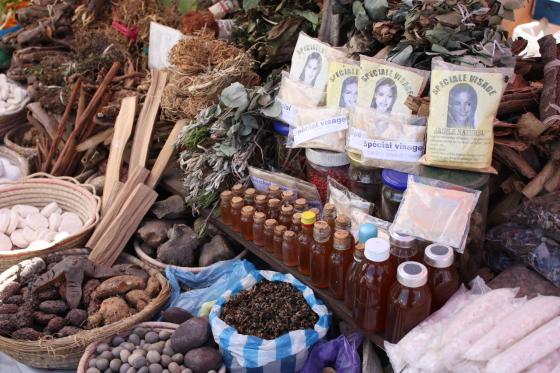Rep. Mensah Wants Traditional, Western Medicines Used Together

Traditional medicine (also known as indigenous or complementary medicine comprises medical aspects of traditional knowledge that developed over generations of various societies before the era of modern medicine.
-- As CHI Executive Director Calls for investment in traditional medicine
Bong County District #6 Representative, Moima Briggs Mensah has called for the use of both traditional and western medicines in the country.
Rep. Mansah called on health authorities to look at sustaining traditional midwives who continue to make sacrifices for pregnant women and Liberia. Traditional medicine or indigenous medicine is the oldest form of the healthcare system in Liberia and many people are still believing in it. Rep. Mensah made the call on Friday, September 3, 2021, at the official launch of a research report, “Strengthening Integrated Health System in Liberia”, organized by Community Healthcare Initiative (CHI) and implemented by JAC Consultancy.
The research report “Strengthening Integrated Health Systems, while Exposing and Challenging Colonialism in Public Health in Liberia," with a focus on maternal health research, was carried out in Montserrado Margibi and Grand Bassa counties. Rep. Mensah said there are health centers in parts of Liberia that are unable to provide simple drugs to patients, thereby discouraging them from seeking medical treatment and causing them to return to traditional medicines for their health.
She said NGOs, traditional people and community dwellers agreed that the midwives would take pregnant women to the hospitals or clinics for treatment regularly until birth and these midwives would receive lappas, soap and L$1,000. However, these things are not happening again.
“If a pregnant woman gives birth, the clinic does not have enough space to keep the baby mother there until the midwife’s money is paid and, sometimes, both parties are urged to settle the issue in the community. Midwives walk in the bushes just to take pregnant women for treatment at the health center and, at the end, do not get anything,” Rep. Mensah stated.
She added that long distances, as well as resources, continue to discourage many people from going to hospitals or clinics in many parts of Liberia, but hopes that Liberia can do better by training midwives and providing empowerment and advising them on what to handle.
Rep. Mensah narrated she had a child between the ages 17 and 18 who was pregnant and was advised by health workers that she would not deliver by herself. But a midwife in the community gave her a leaf to boil and drink regularly and, if she obeyed, she would give birth by herself, which later happened just as the midwife instructed.
“If you tell that little girl to go to hospital, do you think she will go?”
Naomi Tulay-Solanke, Founder and Executive Director of the Community Healthcare Initiative (CHI), lauded the Open Society Initiatives, JAC Consultancy, Ministry of Health for the partnership and support. Mrs. Tulay-Solanke said the study does not just challenge colonialism and describes it as bad, but shows the importance of recognizing the traditional health practitioners and highlights the need for strengthening their capacity.
“In as much as we have been westernized, we need to recognize that one side will not save all. We need to ensure that the work that happens at the community level is being recognized,” Mrs. Tulay-Solanke said.
Mrs. Tulay-Solanke said though Liberia may have a priority, donors have a way of pushing organizations and governments of what they (donors) want to do. Friday’s launch brought together representatives from the three mentioned counties' health teams, Partner in Health, Last Mile, Action Against Hunger, Plan Liberia, and others.
The Director for the National Community Health Program at the Ministry of Health (MoH), Dr. S. Olasford Wiah, said neocolonialism is still being practiced by big and small countries, and partners. Launching the report along with Rep. Mensah, Dr. Wiah said Liberia has made significant efforts over the years but it remains that all of the country’s programs, particularly in health, remain donor-driven. Therefore, he added, Liberia has to abide by the restrictions from development partners.
“Often, we can’t do this because the money is for this. We can’t allow you to use the money because of some reasons and those are all forms of funding control mechanisms and it continues to make Liberia be dependent. And because Liberia does not have the opportunity to roll, we continue to depend on these worthy nations,” Dr. Wiah said.
According to him, there are lots of good things that Liberia has achieved in line with community health, including the increase in facility base delivery from 37 percent from 2007 to 80 percent in 2020, while home delivery has decreased.
Dr. Wiah expressed gratitude to CHI and promised to ensure that the research report is embedded in the impending national community program plan for national use. Juston Kiamue, Monitoring and Evaluation Coordinator of Plan Liberia, lauded CHI and pledged the organization’s commitment to working with CHI.
Meanwhile, the report can be access via https://chciliberia.org/research-report-on-strengthening-integrated-health-systems/.
